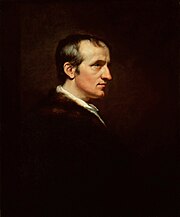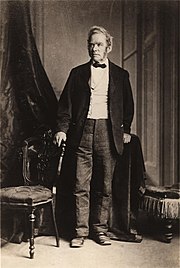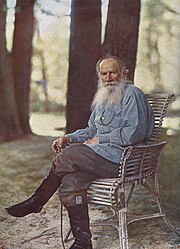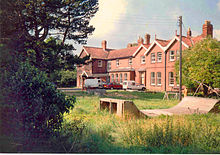Anarchism has had a special interest on the issue of education from the works of William Godwin and Max Stirner onwards.
A wide diversity of issues related to education have gained the attention of anarchist theorists and activists. They have included the role of education in social control and socialization, the rights and liberties of youth and children within educational contexts, the inequalities encouraged by current educational systems, the influence of state and religious ideologies in the education of people, the division between social and manual work and its relationship with education, sex education and art education.
Various alternatives to contemporary mainstream educational systems and their problems have been proposed by anarchists which have gone from alternative education systems and environments, self-education, advocacy of youth and children rights, and freethought activism.
Early anarchist views on education
William Godwin
For English enlightenment anarchist William Godwin education was "the main means by which change would be achieved." Godwin saw that the main goal of education should be the promotion of happiness.
For Godwin, education had to have "A respect for the child’s autonomy
which precluded any form of coercion", "A pedagogy that respected this
and sought to build on the child’s own motivation and initiatives" and
"A concern about the child’s capacity to resist an ideology transmitted
through the school."
In his Political Justice he criticizes state sponsored schooling "on account of its obvious alliance with national government". For him the State "will not fail to employ it to strengthen its hands, and perpetuate its institutions.".
He thought "It is not true that our youth ought to be instructed to
venerate the constitution, however excellent; they should be instructed
to venerate truth; and the constitution only so far as it corresponded
with their independent deductions of truth.". A long work on the subject of education to consider is The Enquirer. Reflections On Education, Manners, And Literature. In A Series Of Essays.
Max Stirner
Max Stirner was a German philosopher linked mainly with the anarchist school of thought known as individualist anarchism who worked as a schoolteacher in a gymnasium for young girls. He examines the subject of education directly in his long essay The False Principle of our Education.
In it "we discern his persistent pursuit of the goal of individual
self-awareness and his insistence on the centering of everything around
the individual personality".
As such Stirner "in education, all of the given material has value only
in so far as children learn to do something with it, to use it".
In that essay he deals with the debates between realist and humanistic
educational commentators and sees that both "are concerned with the
learner as an object, someone to be acted upon rather than one
encouraged to move toward subjective self-realization and liberation"
and sees that "a knowledge which only burdens me as a belonging and a
possession, instead of having gone along with me completely so that the
free-moving ego, not encumbered by any dragging possessions, passes
through the world with a fresh spirit, such a knowledge then, which has
not become personal, furnishes a poor preparation for life".
He concludes this essay by saying that "the necessary decline of
non-voluntary learning and rise of the self-assured will which perfects
itself in the glorious sunlight of the free person may be expressed
somewhat as follows: knowledge must die and rise again as will and
create itself anew each day as a free person.".
Stirner thus saw education "is to be life and there, as outside of it,
the self-revelation of the individual is to be the task."
For him "pedagogy should not proceed any further towards civilizing,
but toward the development of free men, sovereign characters".
Josiah Warren
Josiah Warren is widely regarded as the first American anarchist. "Where utopian projectors starting with Plato
entertained the idea of creating an ideal species through eugenics and
education and a set of universally valid institutions inculcating shared
identities, Warren wanted to dissolve such identities in a solution of
individual self-sovereignty. His educational experiments, for example,
possibly under the influence of the...Swiss educational theorist Johann Heinrich Pestalozzi (via Robert Owen),
emphasized—as we would expect—the nurturing of the independence and the
conscience of individual children, not the inculcation of pre-conceived
values."
The classics and the late 19th century
Mikhail Bakunin
On "Equal Opportunity in Education" Russian anarchist Mikhail Bakunin
denounced what he saw as the social inequalities caused by the current
educational systems. He put this issue in this way "will it be feasible
for the working masses to know complete emancipation as long as the
education available to those masses continues to be inferior to that
bestowed upon the bourgeois, or, in more general terms, as long as there
exists any class, be it numerous or otherwise, which, by virtue of
birth, is entitled to a superior education and a more complete
instruction? Does not the question answer itself?..."
He also denounced that "Consequently while some study others must
labour so that they can produce what we need to live — not just
producing for their own needs, but also for those men who devote
themselves exclusively to intellectual pursuits.
As a solution to this Bakunin proposed that "Our answer to that is a
simple one: everyone must work and everyone must receive education...for
work's sake as much as for the sake of science, there must no longer be
this division into workers and scholars and henceforth there must be
only men. "
Peter Kropotkin
Russian anarcho-communist theorist Peter Kropotkin
suggested in "Brain Work and Manual Work" that "The masses of the
workmen do not receive more scientific education than their grandfathers
did; but they have been deprived of the education of even the small
workshop, while their boys and girls are driven into a mine, or a
factory, from the age of thirteen, and there they soon forget the little
they may have learned at school. As to the scientists, they despise
manual labour."
So for Kropotkin "We fully recognise the necessity of specialisation of
knowledge, but we maintain that specialisation must follow general
education, and that general education must be given in science and
handicraft alike. To the division of society into brainworkers and
manual workers we oppose the combination of both kinds of activities;
and instead of `technical education,' which means the maintenance of the
present division between brain work and manual work, we advocate the
éducation intégrale, or complete education, which means the
disappearance of that pernicious distinction."
The Early 20th century
Leo Tolstoy
Leo Tolstoy, influential christian anarchist and anarcho pacifist theorist
The Russian christian anarchist and famous novelist Leo Tolstoy established a school for peasant children on his estate.
Tolstoy returned to Yasnaya Polyana and founded thirteen schools for
his serfs' children, based on the principles Tolstoy described in his
1862 essay "The School at Yasnaya Polyana".
Tolstoy's educational experiments were short-lived due to harassment by
the Tsarist secret police, but as a direct forerunner to A. S. Neill's Summerhill School, the school at Yasnaya Polyana can justifiably be claimed to be the first example of a coherent theory of democratic education.
Tolstoy differentiated between education and culture.
He wrote that "Education is the tendency of one man to make another
just like himself... Education is culture under restraint, culture is
free. [Education is] when the teaching is forced upon the pupil, and
when then instruction is exclusive, that is when only those subjects are
taught which the educator regards as necessary". For him "without compulsion, education was transformed into culture".
Francesc Ferrer i Guàrdia and the Modern schools
Francesc Ferrer i Guàrdia, Catalan anarchist pedagogue
In 1901, Catalan anarchist and free-thinker Francesc Ferrer established "modern" or progressive schools in Barcelona in defiance of an educational system controlled by the Catholic Church. The schools' stated goal was to "educate the working class
in a rational, secular and non-coercive setting". Fiercely
anti-clerical, Ferrer believed in "freedom in education", education free
from the authority of church and state. Murray Bookchin
wrote: "This period [1890s] was the heyday of libertarian schools and
pedagogical projects in all areas of the country where Anarchists
exercised some degree of influence. Perhaps the best-known effort in
this field was Francisco Ferrer's Modern School (Escuela Moderna), a
project which exercised a considerable influence on Catalan education
and on experimental techniques of teaching generally." La Escuela Moderna, and Ferrer's ideas generally, formed the inspiration for a series of Modern Schools in the United States,[15] Cuba, South America and London. The first of these was started in New York City in 1911. It also inspired the Italian newspaper Università popolare, founded in 1901.
Ferrer wrote an extensive work on education and on his educational experiments called The Origin and Ideals of the Modern School.
The Modern School movement in the United States
The NYC Modern School, ca. 1911–1912, Principal Will Durant and pupils. This photograph was the cover of the first issue of The Modern School magazine.
The Modern Schools, also called Ferrer Schools, were United States schools, established in the early twentieth century, that were modeled after the Escuela Moderna of Francesc Ferrer, the Catalan educator and anarchist. They were an important part of the anarchist, free schooling, socialist, and labor movements in the U.S., intended to educate the working-classes from a secular, class-conscious
perspective. The Modern Schools imparted day-time academic classes for
children, and night-time continuing-education lectures for adults.
The first, and most notable, of the Modern Schools was founded in
New York City, in 1911, two years after Francesc Ferrer i Guàrdia's
execution for sedition in monarchist Spain on 18 October 1909. Commonly called the Ferrer Center, it was founded by notable anarchists — including Leonard Abbott, Alexander Berkman, Voltairine de Cleyre, and Emma Goldman — first meeting on St. Mark's Place, in Manhattan's Lower East Side, but twice moved elsewhere, first within lower Manhattan, then to Harlem. The Ferrer Center opened with only nine students, one being the son of Margaret Sanger, the contraceptives-rights activist. Starting in 1912, the school's principal was the philosopher Will Durant, who also taught there. Besides Berkman and Goldman, the Ferrer Center faculty included the Ashcan School painters Robert Henri and George Bellows, and its guest lecturers included writers and political activists such as Margaret Sanger, Jack London, and Upton Sinclair. Student Magda Schoenwetter, recalled that the school used Montessori methods and equipment, and emphasised academic freedom rather than fixed subjects, such as spelling and arithmetic. The Modern School magazine originally began as a newsletter for parents, when the school was in New York City, printed with the manual printing press
used in teaching printing as a profession. After moving to the Stelton
Colony, New Jersey, the magazine's content expanded to poetry, prose,
art, and libertarian education articles; the cover emblem and interior
graphics were designed by Rockwell Kent. Artists and writers, among them Hart Crane and Wallace Stevens, praised The Modern School as “the most beautifully printed magazine in existence.”
After the 4 July 1914 Lexington Avenue bombing,
the police investigated and several times raided the Ferrer Center and
other labor and anarchist organisations in New York City. Acknowledging the urban danger to their school, the organizers bought 68 acres (275,000 m²) in Piscataway Township, New Jersey, and moved there in 1914, becoming the center of the Stelton Colony. Moreover, beyond New York City, the Ferrer Colony and Modern School
was founded (ca. 1910–1915) as a Modern School-based community, that
endured some forty years. In 1933, James and Nellie Dick, who earlier
had been principals of the Stelton Modern School, founded the Modern
School in Lakewood, New Jersey, which survived the original Modern School, the Ferrer Center, becoming the final surviving such school, lasting until 1958.
Emma Goldman
In an essay entitled "The child and its enemies" Lithuanian-American anarcha-feminist Emma Goldman
manifested that "The child shows its individual tendencies in its
plays, in its questions, in its association with people and things. But
it has to struggle with everlasting external interference in its world
of thought and emotion. It must not express itself in harmony with its
nature, with its growing personality. It must become a thing, an object.
Its questions are met with narrow, conventional, ridiculous replies,
mostly based on falsehoods; and, when, with large, wondering, innocent
eyes, it wishes to behold the wonders of the world, those about it
quickly lock the windows and doors, and keep the delicate human plant in
a hothouse atmosphere, where it can neither breathe nor grow freely."
Goldman in the essay entitled "The Social Importance of the Modern
School" saw that "the school of today, no matter whether public,
private, or parochial...is for the child what the prison is for the
convict and the barracks for the soldier — a place where everything is
being used to break the will of the child, and then to pound, knead, and
shape it into a being utterly foreign to itself."
In this way "it will be necessary to realize that education of
children is not synonymous with herdlike drilling and training. If
education should really mean anything at all, it must insist upon the
free growth and development of the innate forces and tendencies of the
child. In this way alone can we hope for the free individual and
eventually also for a free community, which shall make interference and
coercion of human growth impossible."
Goldman in her essay on the Modern School also dealt with the issue of Sex education.
She denounced that "educators also know the evil and sinister results
of ignorance in sex matters. Yet, they have neither understanding nor
humanity enough to break down the wall which puritanism has built around
sex...If in childhood both man and woman were taught a beautiful
comradeship, it would neutralize the oversexed condition of both and
would help woman's emancipation much more than all the laws upon the
statute books and her right to vote."
Later 20th century and contemporary times
Experiments in Germany led to A. S. Neill founding what became Summerhill School in 1921. Summerhill is often cited as an example of anarchism in practice. British anarchists Stuart Christie and Albert Meltzer
manifested that "A.S. Neill is the modern pioneer of libertarian
education and of “hearts not heads in the school”. Although he has
denied being an anarchist, it would be hard to know how else to describe
his philosophy, though he is correct in recognising the difference
between revolution in philosophy and pedagogy, and the revolutionary
change of society. They are associated but not the same thing." However, although Summerhill and other free schools are radically libertarian, they differ in principle from those of Ferrer by not advocating an overtly political class struggle-approach.
Herbert Read
The English anarchist philosopher, art critic and poet, Herbert Read developed a strong interest in the subject of education and particularly in art education. Read's anarchism was influenced by William Godwin, Peter Kropotkin and Max Stirner.
Read "became deeply interested in children’s drawings and paintings
after having been invited to collect works for an exhibition of British
art that would tour allied and neutral countries during the Second World
War. As it was considered too risky to transport across the Atlantic
works of established importance to the national heritage, it was
proposed that children’s drawings and paintings should be sent instead.
Read, in making his collection, was unexpectedly moved by the expressive
power and emotional content of some of the younger artist’s works. The
experience prompted his special attention to their cultural value, and
his engagement of the theory of children’s creativity with seriousness
matching his devotion to the avant-garde. This work both changed
fundamentally his own life’s work throughout his remaining twenty-five
years and provided art education with a rationale of unprecedented
lucidity and persuasiveness. Key books and pamphlets resulted: Education through Art (Read, 1943); The Education of Free Men (Read, 1944); Culture and Education in a World Order (Read, 1948); The Grass Read, (1955); and Redemption of the Robot (1970)".
Read "elaborated a socio-cultural dimension of creative
education, offering the notion of greater international understanding
and cohesiveness rooted in principles of developing the fully balanced
personality through art education. Read argued in Education through Art
that "every child, is said to be a potential neurotic capable of being
saved from this prospect, if early, largely inborn, creative abilities
were not repressed by conventional Education. Everyone is an artist of
some kind whose special abilities, even if almost insignificant, must be
encouraged as contributing to an infinite richness of collective life.
Read’s newly expressed view of an essential ‘continuity’ of
child and adult creativity in everyone represented a synthesis' the two
opposed models of twentieth-century art education that had predominated
until this point...Read did not offer a curriculum but a theoretical
defence of the genuine and true. His claims for genuineness and truth
were based on the overwhelming evidence of characteristics revealed in
his study of child art...From 1946 until his death in 1968 he was
president of the Society for Education in Art (SEA), the renamed ATG, in
which capacity he had a platform for addressing UNESCO...On
the basis of such representation Read, with others, succeeded in
establishing the International Society for Education through Art (INSEA)
as an executive arm of UNESCO in 1954.
Paul Goodman
Paul Goodman was an important anarchist critic of contemporary educational systems as can be seen in his books Growing Up Absurd and Compulsory Mis-education.
Goodman believed that in contemporary societies "It is in the schools
and from the mass media, rather than at home or from their friends, that
the mass of our citizens in all classes learn that life is inevitably
routine, depersonalized, venally graded; that it is best to toe the mark
and shut up; that there is no place for spontaneity, open sexuality and
free spirit. Trained in the schools they go on to the same quality of
jobs, culture and politics. This is education, miseducation socializing
to the national norms and regimenting to the nation's "needs"
Goodman thought that a person's most valuable educational experiences
"occur outside the school. Participation in the activities of society
should be the chief means of learning. Instead of requiring students to
succumb to the theoretical drudgery of textbook learning, Goodman
recommends that education be transferred into factories, museums,
parks, department stores, etc, where the students can actively
participate in their education...The ideal schools would take the form
of small discussion groups of no more than twenty individuals. As has
been indicated, these groups would utilize any effective environment
that would be relevant to the interest of the group. Such education
would be necessarily non-compulsory, for any compulsion to attend places
authority in an external body disassociated from the needs and
aspirations of the students. Moreover, compulsion retards and impedes
the students' ability to learn."
As far as the current educational system Goodman thought that "The
basic intention behind the compulsory attendance laws is not only to
insure the socialization process but also to control the labour supply
quantitatively within an industrialized economy characterized by
unemployment and inflation. The public schools and universities have
become large holding tanks of potential workers."
Ivan Illich
The term deschooling was popularized by Ivan Illich,
who argued that the school as an institution is dysfunctional for
self-determined learning and serves the creation of a consumer society
instead.
Illich thought that "the dismantling of the public education system
would coincide with a pervasive abolition of all the suppressive
institutions of society".
Illich "charges public schooling with institutionalizing acceptable
moral and behavioral standards and with constitutionally violating the rights of young adults...IIlich
subscribes to Goodman's belief that most
of the useful education that people acquire is a by-product of work or
leisure and not of the school. Illich refers to this process as
"informal education". Only through this unrestricted and unregulated
form of learning can the individual
gain a sense of self-awareness and develop his creative capacity to its
fullest extent."
Illich thought that the main goals of an alternative education systems
should be "to provide access to available resources to all who want to
learn: to empower
all who want to share what they know; to find those who want to learn it
from them; to furnish all who want to present an issue to the public
with the opportunity to make their challenges known. The system of
learning webs is aimed at individual freedom and expression in education
by using society as the classroom. There would be reference services to
index items available for study in laboratories, theatres, airports,
libraries, etc.; skill exchanges which would permit people to list their
skills so that potential students could contact them; peer-matching,
which would communicate an individual's interest so that he or she could
find educational associates; reference services to educators at large,
which would be a central directory of professionals, para professionals
and freelancers.".
Colin Ward
English anarchist Colin Ward in his main theoretical publication Anarchy in Action
(1973) in a chapter called "Schools No Longer" "discusses the genealogy
of education and schooling, in particular examining the writings of Everett Reimer and Ivan Illich, and the beliefs of anarchist educator Paul Goodman. Many of Colin’s writings in the 1970s, in particular Streetwork: The Exploding School (1973, with Anthony Fyson), focused on learning practices and spaces outside of the school building. In introducing Streetwork,
Ward writes, “[this] is a book about ideas: ideas of the environment as
the educational resource, ideas of the enquiring school, the school
without walls…”. In the same year, Ward contributed to Education Without Schools
(edited by Peter Buckman) discussing ‘the role of the state’. He
argued that “one significant role of the state in the national education
systems of the world is to perpetuate social and economic injustice”".
In The Child in the City (1978), and later The Child in the Country
(1988), Ward "examined the everyday spaces of young people’s lives and
how they can negotiate and re-articulate the various environments they
inhabit. In his earlier text, the more famous of the two, Colin Ward
explores the creativity and uniqueness of children and how they
cultivate ‘the art of making the city work’. He argued that through
play, appropriation and imagination, children can counter adult-based
intentions and interpretations of the built environment. His later
text, The Child in the Country, inspired a number of social scientists,
notably geographer Chris Philo (1992), to call for more attention to be
paid to young people as a ‘hidden’ and marginalised group in society."
Bibliography
The Modern School magazine, Spring, 1920
- Archer, William. The Life, Trial, and Death of Francisco Ferrer. London: Chapman and Paul. 1911
- Avrich, Paul. The Modern School Movement: Anarchism and Education in the United States. AK Press, Jan 30, 2006
- Boyd, Carol. P. The Anarchists and education in Spain. (1868-1909). The Journal of Modern History. Vol. 48. No. 4. (Dec. 1976)
- Ferm, Elizabeth Byrne. Freedom in Education. New York: Lear Publishers. 1949
- Goodman, Paul. Compulsory Mis-Education. New York: Horizon. 1964
- Graubard, Allen. Free the Children: Radical Reform and the Free School Movement. New York: Pantheon. 1973
- Hemmings, Ray. Children’s Freedom: A. S. Neill and the Evolutions of the Summerhill Idea. London: Allen & Unwin. 1972
- Illich, Ivan. Deschooling Society. 1971. ISBN 0-06-012139-4.
- Jandric, Petar. "Wikipedia and education: anarchist perspectives and virtual practices." Journal for Critical Education Policy Studies, vol.8. no.2
- Jensen, Derrick. Walking on Water: Reading, Writing, and Revolution, Chelsea Green, 2005, ISBN 978-1-931498-78-4
- Stirner, Max. "The False Principle of Our Education - or Humanism and Realism." . Rheinische Zeitung. April 1842
- Suissa, Judith. Anarchism and Education: a Philosophical Perspective. Routledge. New York. 2006
- Suissa, Judith. "Anarchy in the classroom". New Humanist. Volume 120. Issue 5 September/October 2005













